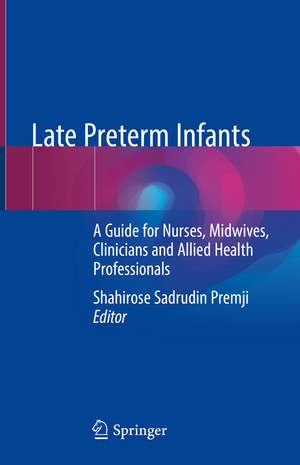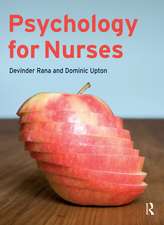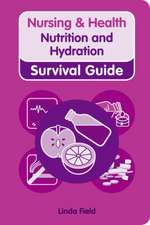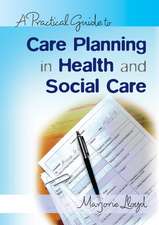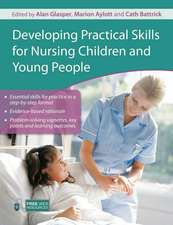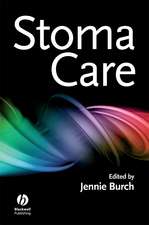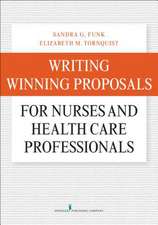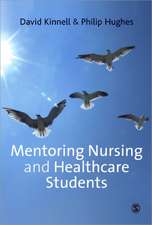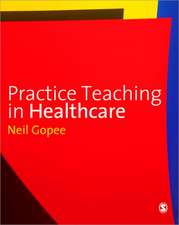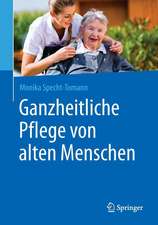Late Preterm Infants: A Guide for Nurses, Midwives, Clinicians and Allied Health Professionals
Editat de Shahirose Sadrudin Premjien Limba Engleză Hardback – 8 mai 2019
This volume analyses the distinct care needs of late preterm infants and their parents by reflecting on the best available evidence to inform practice and latest innovations in care. It addresses the spectrum of issues experienced by late preterm infants and their parents and ways to ensure healthy transitions from hospital to community. We define late preterm infants as those born between 340/7 to 366/7 7 weeks’ gestational age.
The book uses creative writing prompts and a narrative style to gain insight and be self-reflection in and on practice to move the reader to embrace best practices. Issues such as mother’s physical and emotional health, father’s burden in postpartum period, the work organization of nurses caring for late preterm infants, feeding and jaundice which threaten readmission, and neurodevelopmental outcomes of late preterm infants are specifically addressed.
Areas of innovation are shared for consideration to prompt readers to think about continuous improvement in quality of care. The book shares local and global perspectives to address the common concerns related to care of late preterm infants and their parents, and fosters a partnership in promoting health of late preterm infants and their parents all across the globe. It is intended for any health care providers such as nurses, midwives, physicians and other allied care professionals like health visitors, community health workers.
The book uses creative writing prompts and a narrative style to gain insight and be self-reflection in and on practice to move the reader to embrace best practices. Issues such as mother’s physical and emotional health, father’s burden in postpartum period, the work organization of nurses caring for late preterm infants, feeding and jaundice which threaten readmission, and neurodevelopmental outcomes of late preterm infants are specifically addressed.
Areas of innovation are shared for consideration to prompt readers to think about continuous improvement in quality of care. The book shares local and global perspectives to address the common concerns related to care of late preterm infants and their parents, and fosters a partnership in promoting health of late preterm infants and their parents all across the globe. It is intended for any health care providers such as nurses, midwives, physicians and other allied care professionals like health visitors, community health workers.
Preț: 246.60 lei
Preț vechi: 259.58 lei
-5% Nou
Puncte Express: 370
Preț estimativ în valută:
47.19€ • 51.24$ • 39.64£
47.19€ • 51.24$ • 39.64£
Carte tipărită la comandă
Livrare economică 18-24 aprilie
Preluare comenzi: 021 569.72.76
Specificații
ISBN-13: 9783319943510
ISBN-10: 3319943510
Pagini: 140
Ilustrații: XII, 152 p. 20 illus., 8 illus. in color.
Dimensiuni: 155 x 235 x 15 mm
Greutate: 0.45 kg
Ediția:1st ed. 2019
Editura: Springer International Publishing
Colecția Springer
Locul publicării:Cham, Switzerland
ISBN-10: 3319943510
Pagini: 140
Ilustrații: XII, 152 p. 20 illus., 8 illus. in color.
Dimensiuni: 155 x 235 x 15 mm
Greutate: 0.45 kg
Ediția:1st ed. 2019
Editura: Springer International Publishing
Colecția Springer
Locul publicării:Cham, Switzerland
Cuprins
Foreword.- Chapter 1. Who is the late preterm infant and what trouble can he potentially gets into after birth?.- Chapter 2. Mother’s physical health before delivery matters: what happens and why?! Why is hypoglycaemia a potential concern forlate preterm infants?.- Chapter 3. Mother’s emotional health during pregnancy matters: what happens and why?!.- Chapter 4. What do I need to know about the father of a late preterm infant to support him in the postpartum period?.- Chapter 5. The social organization of nurses’ work with late preterm infants in non-tertiary settings: say that again?.- Chapter 6. Why is it so hard to breastfeed a late preterm infant and what can I do to help parents?.- Chapter 7. Why is it so hard to breastfeed a late preterm infant and how to help parents?.- Chapter 8. Am I a frequent flyer? Taking care of late preterm infants and their parents in the community.- Chapter 9. Late preterm infants and neurodevelopmental outcomes: Why do I need to serve and return? Are there innovative therapies we can explore?.- Chapter 10. Perspectives from health care providers local to global: Words of wisdom. Personal reflections of caring for late preterm infants.- Chapter 11. The alternative facts about late preterm infants: You mean there are fake stories about me?.- Conclusion.
Recenzii
“The audience is all healthcare providers involved in the care of these infants: midwives; registered nurses in labor/delivery and postpartum; community‐based nurses; and pediatric nurses in clinics and the NICU. … The best aspect of the book is its readability and the effort the authors make to engage readers by using the first person from an infant perspective. This technique is used to highlight the unique aspects of this population and delineate how they differ from preterm term and term infants.” (Ellyn E Cavanagh,Doody's Book Reviews, August 09, 2019)
Notă biografică
Dr. Shahirose Sadrudin Premji, RN, BSc, BScN, MScN, PhD, FAAN, is affiliated with the University of Calgary as an Associate Professor in the Faculty of Nursing, an Adjunct Associate Professor in the Department of Community Health Sciences, and a nurse scientist.
She has over 25 years’ experience in newborn health and has practiced clinically or provided technical expertise internationally (Australia, Canada, China, Kenya, Tanzania, Pakistan and Syria). Dr. Premji’s academic involvement began in 1994 at McMaster University as Clinical Lecture while working as a Neonatal Nurse Practitioner. She has worked as an Associate Professor and Director, Master of Science in Nursing (MScN) Programme at the Aga Khan University – School of Nursing and Midwifery in Karachi, Pakistan which was as a consultant position with the Aga Khan Foundation Canada – Canadian Development Exchange Program. More recently she was involved in developing research and teaching capacity in the Schools of Nursing & Midwifery in Kenya and Uganda.
Shahirose is the founder and 1st President of the Canadian Association of Neonatal Nurses. She is a former Neonatal Nurse Practitioner and Public Health Nurse (postpartum). Her program of research investigates psychosocial, cultural, and environmental factors as both risk factors and targets of intervention to prevent preterm birth and biological mechanisms whereby psychosocial health contributes to preterm birth with a global health perspective. Methodologies she used in previous research include quantitative, qualitative, mixed methodology, and systematic reviews. She has published several book chapters and many peer-reviewed publications, which comprise Cochrane Systematic Reviews (original and updates), research articles, narrative reviews, and meta-analyses.
Shahirose received the College and Association of Registered Nurses of Alberta’s Centennial Award in 2015, and the Jeanne Mance Award (Canadian Association of Nurses’ highest award) in 2016, and was inducted as Fellow in the American Academy of Nursing for her leadership in teaching, practice, research and administration in 2016. More recently, Shahirose honored as 150 Nurses for Canada! to mark the 150th anniversary of Canadian Confederation and honor 150 nurses for their pioneering work in health innovation in Canada and globally. Shahirose will receive the College & Association of Registered Nurses of Alberta’s Nursing Excellence in Research Award in 2018.
She has over 25 years’ experience in newborn health and has practiced clinically or provided technical expertise internationally (Australia, Canada, China, Kenya, Tanzania, Pakistan and Syria). Dr. Premji’s academic involvement began in 1994 at McMaster University as Clinical Lecture while working as a Neonatal Nurse Practitioner. She has worked as an Associate Professor and Director, Master of Science in Nursing (MScN) Programme at the Aga Khan University – School of Nursing and Midwifery in Karachi, Pakistan which was as a consultant position with the Aga Khan Foundation Canada – Canadian Development Exchange Program. More recently she was involved in developing research and teaching capacity in the Schools of Nursing & Midwifery in Kenya and Uganda.
Shahirose is the founder and 1st President of the Canadian Association of Neonatal Nurses. She is a former Neonatal Nurse Practitioner and Public Health Nurse (postpartum). Her program of research investigates psychosocial, cultural, and environmental factors as both risk factors and targets of intervention to prevent preterm birth and biological mechanisms whereby psychosocial health contributes to preterm birth with a global health perspective. Methodologies she used in previous research include quantitative, qualitative, mixed methodology, and systematic reviews. She has published several book chapters and many peer-reviewed publications, which comprise Cochrane Systematic Reviews (original and updates), research articles, narrative reviews, and meta-analyses.
Shahirose received the College and Association of Registered Nurses of Alberta’s Centennial Award in 2015, and the Jeanne Mance Award (Canadian Association of Nurses’ highest award) in 2016, and was inducted as Fellow in the American Academy of Nursing for her leadership in teaching, practice, research and administration in 2016. More recently, Shahirose honored as 150 Nurses for Canada! to mark the 150th anniversary of Canadian Confederation and honor 150 nurses for their pioneering work in health innovation in Canada and globally. Shahirose will receive the College & Association of Registered Nurses of Alberta’s Nursing Excellence in Research Award in 2018.
Textul de pe ultima copertă
This volume analyses the distinct care needs of late preterm infants and their parents by reflecting on the best available evidence to inform on practice and latest innovations in care. It addresses the spectrum of issues experienced by late preterm infants and their parents to ensure their health life trajectories. We define late preterm infants as those born between 34 0/7 to 36 6/7 weeks’ gestational age.
The book uses creative writing prompts and a narrative style to gain insight and self-reflection in and on practice to move the reader to embracing best practices. Issues such as mother’s physical and emotional health, father’s burden in postpartum period and neurodevelopmental outcomes of late preterm infants are specifically addressed.
Areas of innovation are shared for consideration to prompt readers thinking about continuous improvement in quality of care. The book shares local and global perspectives to address the common concerns related to care of late preterm infants and their families, and to foster a partnership in promoting their health all across the globe. It is intended to any health care providers such as nurses, midwives, physicians and other allied care professionals like health visitors, community health workers.
Caracteristici
Details the current best practices and future innovation to care for late preterm infants and their families Presents a multidisciplinary approach for a better collaboration in late preterm infants care management Presented in a playful manner
